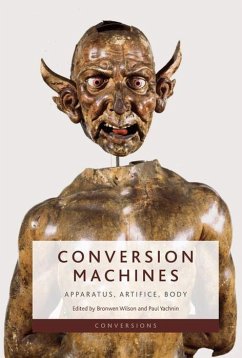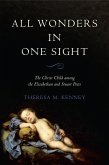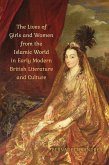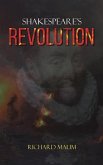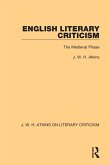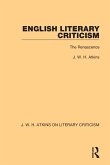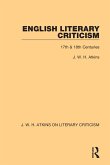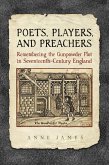Conversion Machines
Apparatus, Artifice, Body
Herausgeber: Wilson, Bronwen; Yachnin, Paul
Conversion Machines
Apparatus, Artifice, Body
Herausgeber: Wilson, Bronwen; Yachnin, Paul
- Gebundenes Buch
- Merkliste
- Auf die Merkliste
- Bewerten Bewerten
- Teilen
- Produkt teilen
- Produkterinnerung
- Produkterinnerung
Examines how mechanisms of change and conversions harrowed and transformed early modern people and their worlds
Andere Kunden interessierten sich auch für
![All Wonders in One Sight All Wonders in One Sight]() Theresa M. KenneyAll Wonders in One Sight82,99 €
Theresa M. KenneyAll Wonders in One Sight82,99 €![The Lives of Girls and Women from the Islamic World in Early Modern British Literature and Culture The Lives of Girls and Women from the Islamic World in Early Modern British Literature and Culture]() Bernadette AndreaThe Lives of Girls and Women from the Islamic World in Early Modern British Literature and Culture93,99 €
Bernadette AndreaThe Lives of Girls and Women from the Islamic World in Early Modern British Literature and Culture93,99 €![Shakespeare's Revolution Shakespeare's Revolution]() Richard MalimShakespeare's Revolution22,99 €
Richard MalimShakespeare's Revolution22,99 €![English Literary Criticism English Literary Criticism]() J. W. H. AtkinsEnglish Literary Criticism53,99 €
J. W. H. AtkinsEnglish Literary Criticism53,99 €![English Literary Criticism English Literary Criticism]() J. W. H. AtkinsEnglish Literary Criticism56,99 €
J. W. H. AtkinsEnglish Literary Criticism56,99 €![English Literary Criticism English Literary Criticism]() J. W. H. AtkinsEnglish Literary Criticism56,99 €
J. W. H. AtkinsEnglish Literary Criticism56,99 €![Poets, Players, and Preachers Poets, Players, and Preachers]() Anne JamesPoets, Players, and Preachers122,99 €
Anne JamesPoets, Players, and Preachers122,99 €-
-
-
Examines how mechanisms of change and conversions harrowed and transformed early modern people and their worlds
Hinweis: Dieser Artikel kann nur an eine deutsche Lieferadresse ausgeliefert werden.
Hinweis: Dieser Artikel kann nur an eine deutsche Lieferadresse ausgeliefert werden.
Produktdetails
- Produktdetails
- Conversions
- Verlag: Edinburgh University Press
- Seitenzahl: 384
- Erscheinungstermin: 12. Juni 2023
- Englisch
- Abmessung: 234mm x 156mm x 22mm
- Gewicht: 778g
- ISBN-13: 9781399516006
- ISBN-10: 1399516000
- Artikelnr.: 66405733
- Herstellerkennzeichnung
- Libri GmbH
- Europaallee 1
- 36244 Bad Hersfeld
- gpsr@libri.de
- Conversions
- Verlag: Edinburgh University Press
- Seitenzahl: 384
- Erscheinungstermin: 12. Juni 2023
- Englisch
- Abmessung: 234mm x 156mm x 22mm
- Gewicht: 778g
- ISBN-13: 9781399516006
- ISBN-10: 1399516000
- Artikelnr.: 66405733
- Herstellerkennzeichnung
- Libri GmbH
- Europaallee 1
- 36244 Bad Hersfeld
- gpsr@libri.de
Bronwen Wilson teaches Art History at UCLA where she is the Edward W. Carter Chair in European Art and the Director of the Center for 17th- and 18th-Century Studies at William Andrews Clark Memorial Library. Her research and teaching explore the artistic and urban cultures of early modern Europe (1300-1700), with a focus on space, print, portraiture, landscape and transcultural, material and environmental interactions. Recent publications include two volumes co-edited with Angela Vanhaelen: Making Worlds: Global Invention in the Early Modern Period (2022) and "Making Worlds: Art, Materiality, and Early Modern Globalization", a special issue of the Journal of Early Modern History (23, nos. 2-3, May 2019), and several articles, such as "Afterword: Ornament and the Fabrication of Early Modern Worlds", in Bodies and Maps: Early Modern Personifications of the Continents, (eds) Louise Arizzoli and Maryanne Horowitz (Brill, 2020); and "Spiritual and Material Conversions: Federico Barocci's Christ and Mary Magdalene," Quid est sacramentum?: On the Visual Representation of Sacred Mysteries in Early Modern Europe, 1500-1700, (eds) Walter Melion, Lee Palmer Wandel and Elizabeth Pastan (Brill, October 2019). Her current book project, "Otherworldly Natures: Lithic Formations, In-Between Spaces, and Early Modern Italian Art", probes artistic engagement with quarries and riverbeds. She currently serves as Vice President of the Renaissance Society of America. Paul Yachnin is Tomlinson Professor of Shakespeare Studies at McGill University. From 2013-2019, he directed the Early Modern Conversions Project (http: //earlymodernconversions.com/). His ideas about the social life of art were featured on the CBC Radio series, "The Origins of the Modern Public." Among his publications are the books, Stage-Wrights and The Culture of Playgoing in Early Modern England (with Anthony Dawson), co-editions of Richard II and The Tempest, and edited books such as Making Publics in Early Modern Europe (with Bronwen Wilson) and Forms of Association. He leads the TRaCE Transborder Project, which will track the career pathways of PhD graduates from universities in Africa, Australia, Canada, China, England, India, the Netherlands, and the USA, will tell the stories of many graduates, and will undertake to create an international mentoring community. He publishes regularly on graduate education policy and academic culture and on how Shakespeare can speak to the challenges of the 21st century.

